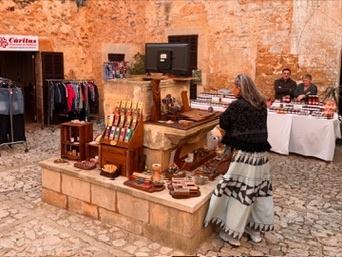How does Mallorcan folklore contribute to preserving the Catalan language and local dialects for travelers interested in linguistic culture?
Similar Topics
mallorcan folklore
catalan language preservation
local dialects
linguistic culture travel
traditional mallorcan stories
ball de bot
glosat poetry
cultural language heritage
Mallorcan folklore plays a vital role in preserving the Catalan language and its distinctive local dialects, offering travelers a rich cultural experience that deepens their understanding of the region's linguistic heritage. Folklore, encompassing traditional stories, music, dances, and festivals, serves as a living repository of language that has been passed down through generations. In Mallorca, these oral and performative traditions are predominantly conveyed in Catalan, often featuring unique expressions and vocabulary specific to the island, providing a natural context where travelers can hear and appreciate the language in everyday use.
By engaging with Mallorcan folklore, visitors gain exposure to authentic linguistic nuances that are less common in formal education or media. Events such as the traditional “Ball de Bot” dances or “Glosat” improvisational poetry recitals showcase the local dialect and its rhythmic qualities, making the language both vibrant and accessible. These cultural activities also foster communal participation, encouraging locals to maintain their linguistic identity in the face of globalization and language homogenization. For travelers interested in linguistic culture, this immersive environment offers a chance to observe how language thrives within social and cultural frameworks, enhancing their appreciation of Catalan beyond the written word.
Moreover, local storytellers and musicians often incorporate historical and mythological content that grounds the Catalan language in Mallorca’s unique cultural and geographic landscape. This reinforces the connection between language and place, illustrating how dialects evolve through interaction with local history and traditions. Folklore thus acts as both a cultural anchor and a dynamic expression of linguistic resilience, allowing travelers to witness the ongoing preservation of Mallorcan Catalan in a context that values heritage and identity. Ultimately, exploring Mallorcan folklore enriches visitors not only through exposure to language but also through a deeper understanding of how language actively shapes and is shaped by cultural life on the island.
By engaging with Mallorcan folklore, visitors gain exposure to authentic linguistic nuances that are less common in formal education or media. Events such as the traditional “Ball de Bot” dances or “Glosat” improvisational poetry recitals showcase the local dialect and its rhythmic qualities, making the language both vibrant and accessible. These cultural activities also foster communal participation, encouraging locals to maintain their linguistic identity in the face of globalization and language homogenization. For travelers interested in linguistic culture, this immersive environment offers a chance to observe how language thrives within social and cultural frameworks, enhancing their appreciation of Catalan beyond the written word.
Moreover, local storytellers and musicians often incorporate historical and mythological content that grounds the Catalan language in Mallorca’s unique cultural and geographic landscape. This reinforces the connection between language and place, illustrating how dialects evolve through interaction with local history and traditions. Folklore thus acts as both a cultural anchor and a dynamic expression of linguistic resilience, allowing travelers to witness the ongoing preservation of Mallorcan Catalan in a context that values heritage and identity. Ultimately, exploring Mallorcan folklore enriches visitors not only through exposure to language but also through a deeper understanding of how language actively shapes and is shaped by cultural life on the island.
🧩 Related Questions
Related Question
How do traditional farming practices in Mallorca help farmers cope with the dry climate?
Related Question
How do prolonged drought periods impact the health and growth of Mallorca's local flora?
Related Question
How do winter weather conditions in Mallorca impact ferry services and island-hopping trips?
